
St Petersburg Mathematical Journal
Scope & Guideline
Connecting Minds through Cutting-edge Mathematical Research
Introduction
Aims and Scopes
- Functional Analysis and Operator Theory:
The journal frequently publishes research related to functional analysis, including operator theory, spectral theory, and the study of various types of operators, such as Schrödinger operators and non-self-adjoint operators. - Algebra and Group Theory:
A significant portion of the journal's content is dedicated to algebraic structures, particularly group theory, representation theory, and the study of Lie groups and algebras. - Geometry and Topology:
Research related to geometric structures, symmetric spaces, and topological properties is prevalent, demonstrating the journal's engagement with both pure and applied geometry. - Partial Differential Equations (PDEs):
The journal covers a wide range of topics in PDEs, including existence and uniqueness results, boundary value problems, and applications in mathematical physics. - Complex Analysis and Function Theory:
Papers on complex analysis, particularly those dealing with analytic functions, growth conditions, and approximation theory, are commonly featured. - Mathematical Physics:
The journal includes studies that bridge mathematics and physics, exploring mathematical models in quantum mechanics and other areas of theoretical physics. - Numerical Analysis and Approximation Theory:
Research exploring numerical methods, approximation techniques, and their theoretical underpinnings is also a consistent focus, indicating the journal's interest in applied mathematics.
Trending and Emerging
- Noncommutative Geometry:
There is a notable increase in research related to noncommutative geometry, reflecting a growing interest in its applications and theoretical implications within mathematics. - Quantum Mechanics and Mathematical Models:
The intersection of mathematics and quantum mechanics is increasingly prominent, with several papers exploring mathematical models in quantum theory, indicating a trend towards applied mathematical physics. - Advanced Operator Theory:
Research on advanced topics in operator theory, including non-self-adjoint operators and spectral properties, has seen a rise, demonstrating a shift towards deeper investigations in this area. - Stochastic Processes and Random Fields:
Emerging themes in stochastic processes, including their mathematical foundations and applications, are becoming more prevalent, reflecting an increased interest in probabilistic methods. - Functional Spaces and Inequalities:
There is a growing emphasis on functional spaces and inequalities, particularly in relation to Sobolev spaces and their applications, showcasing a trend towards rigorous analysis and optimization problems.
Declining or Waning
- Classical Number Theory:
Papers related to classical number theory have become less frequent, indicating a potential waning interest in traditional number-theoretic problems within the journal's scope. - Combinatorial Mathematics:
The focus on combinatorial mathematics and related topics has diminished, suggesting a shift towards more analytical and structural aspects of mathematics. - Elementary Geometry:
Research that emphasizes elementary geometric concepts and problems has decreased, reflecting a possible transition to more complex geometric and topological studies.
Similar Journals
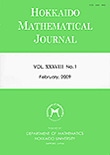
Hokkaido Mathematical Journal
Connecting theory and application in the realm of mathematics.Hokkaido Mathematical Journal, published by Hokkaido University, Department of Mathematics, stands as a pivotal platform for scholarly discourse in the field of mathematics. Established in 1972, this peer-reviewed journal has consistently contributed to the advancement of mathematical research, covering a wide spectrum of topics within the discipline. With its current ranking in the third quartile (Q3) among miscellaneous mathematics journals, it offers valuable insights and findings that cater to both established researchers and budding mathematicians alike. The journal is accessible through traditional subscription, fostering a community that values rigorous theoretical exploration and applied mathematical methods. As it approaches its convergence year in 2024, Hokkaido Mathematical Journal remains essential for those dedicated to pushing the boundaries of mathematical knowledge and innovation in Japan and beyond.
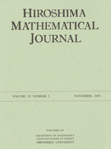
Hiroshima Mathematical Journal
Advancing Mathematical Knowledge Since 1959The Hiroshima Mathematical Journal, published by Hiroshima University, Graduate School of Science, serves as a prominent platform for disseminating high-quality research in the field of mathematics. Established in 1959, the journal has been an integral part of the mathematical community, focusing on areas such as Algebra, Number Theory, Analysis, and Geometry and Topology. Although currently classified in Q4 quartile rankings within its categories, the journal is committed to advancing mathematical knowledge and fostering scholarly dialogue. Its accessibility, combined with its long-standing history, makes it an essential resource for researchers, professionals, and students dedicated to exploring and enhancing the mathematical sciences. For those interested in contributing or accessing cutting-edge research, the Hiroshima Mathematical Journal continues to uphold its mission of excellence in mathematical scholarship.

Miskolc Mathematical Notes
Fostering Innovation in Mathematical DisciplinesMiskolc Mathematical Notes is a distinguished journal in the field of mathematics, published by the University of Miskolc Institute of Mathematics in Hungary. With a commitment to advancing research in areas such as Algebra and Number Theory, Analysis, Control and Optimization, Discrete Mathematics and Combinatorics, and Numerical Analysis, this journal provides a platform for both theoretical and applied contributions that enhance the understanding of complex mathematical concepts. Established in 2010, the journal has steadily gained a reputation, reflected in its 2023 categorization as a Q3 journal across several mathematical disciplines. While it operates under a traditional access model, researchers and mathematicians will find invaluable insights in its peer-reviewed articles. With Scopus rankings demonstrating respectable performance in various mathematical categories, Miskolc Mathematical Notes serves as an essential resource for scholars aiming to stay at the forefront of mathematical research and its applications.

Rendiconti del Circolo Matematico di Palermo
Fostering Scholarly Dialogue Across Mathematical Disciplines.Rendiconti del Circolo Matematico di Palermo, published by SPRINGER-VERLAG ITALIA SRL, is a revered journal in the field of mathematics, emphasizing the cultivation and dissemination of mathematical knowledge since its inception in 1887. With its ISSN 0009-725X and E-ISSN 1973-4409, this esteemed publication has continued to thrive, showcasing innovative research, comprehensive reviews, and thoughtful discussions from diverse areas in mathematics, particularly in its Q2 ranking within the miscellaneous mathematics category. Its historical significance is underscored by its convergence of publications across numerous years, including its notable periods from 1887 to 1916, 1919 to 1938, and beyond, effectively capturing the evolution of mathematical thought. Though not open access, the journal remains an essential resource for researchers, professionals, and students aiming to stay updated with the latest advancements and methodologies in the ever-evolving landscape of mathematics. With its Scopus rank placing it in the top 25th percentile, Rendiconti del Circolo Matematico di Palermo continues to be a cornerstone for scholarly dialogue and development in its domain.
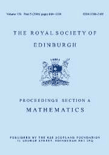
PROCEEDINGS OF THE ROYAL SOCIETY OF EDINBURGH SECTION A-MATHEMATICS
Connecting Ideas, Inspiring DiscoveriesPROCEEDINGS OF THE ROYAL SOCIETY OF EDINBURGH SECTION A-MATHEMATICS is a prestigious journal published by Cambridge University Press, focusing on high-quality research in the field of mathematics. Established in 1975, this journal has carved a niche in the academic community, evidenced by its categorization in the Q1 quartile for Mathematics (miscellaneous) in 2023 and a commendable Scopus rank of #59 out of 399 in General Mathematics, positioning it within the 85th percentile among its peers. The journal serves as a platform for disseminating innovative mathematical theories and methodologies, making it an essential resource for researchers, professionals, and students alike. Though not currently an open-access publication, it offers various access options catering to a broad audience. With a publication timeline extending through to 2024, PROCEEDINGS OF THE ROYAL SOCIETY OF EDINBURGH SECTION A-MATHEMATICS remains committed to advancing mathematical knowledge and fostering a scholarly environment conducive to scientific inquiry and collaboration.

Ukrainian Mathematical Journal
Nurturing Knowledge in the Mathematical CommunityThe Ukrainian Mathematical Journal is a prominent academic publication in the field of mathematics, focusing on a diverse range of topics that appeal to researchers, professionals, and students alike. Published by Springer, this journal has been an important platform for disseminating significant mathematical research since its inception in 1957. With the aim of fostering knowledge and collaboration within the mathematical community, the journal curates high-quality articles that meet rigorous scholarly standards, evidenced by its Q3 ranking in the miscellaneous mathematics category for 2023. Although it currently does not offer open access, the journal remains accessible through various institutional subscriptions. It serves as a vital resource for ongoing discourse in the field and invites contributions that further advance mathematical understanding.

Forum of Mathematics Sigma
Empowering the mathematical community with impactful insights.Forum of Mathematics Sigma is a premier open access journal published by Cambridge University Press that has been at the forefront of mathematical research since its inception in 2013. With a strong emphasis on advancing the fields of mathematics, the journal consistently achieves Q1 rankings across multiple categories, including Algebra and Number Theory, Analysis, and Computational Mathematics. This distinction highlights its impact and relevance within the scholarly community. The journal prides itself on providing a platform for innovative research, fostering collaboration among researchers and practitioners across various mathematical disciplines. Open access publication ensures that cutting-edge findings are widely available to readers globally, enhancing the dissemination of knowledge. With an address in the heart of Cambridge, England, Forum of Mathematics Sigma is dedicated to promoting high-quality research and making significant contributions to the development of mathematics.
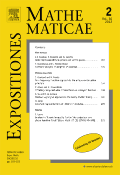
EXPOSITIONES MATHEMATICAE
Championing Excellence in Mathematical ScholarshipEXPOSITIONES MATHEMATICAE, published by Elsevier GmbH, stands as a significant journal in the realm of mathematics, catering primarily to researchers, professionals, and students. With an ISSN of 0723-0869 and an E-ISSN of 1878-0792, this journal has made its mark in the academic community, boasting a Q2 classification in the miscellaneous mathematics category for 2023, illustrating its prominence within its field. The journal addresses a diverse scope of mathematical topics, encouraging the publication of original research and innovative theories while maintaining rigorous academic standards. As it converges from 2004 to 2024, EXPOSITIONES MATHEMATICAE continues to be an essential resource for advancing mathematical knowledge and fostering scholarly communication, despite being a non-open-access publication. Its location in Munich, Germany further anchors it within a rich intellectual tradition, providing accessibility for the mathematical community worldwide.
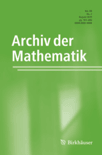
ARCHIV DER MATHEMATIK
Advancing Mathematical Frontiers Since 1948ARCHIV DER MATHEMATIK is a distinguished journal published by SPRINGER BASEL AG, renowned for its contributions to the field of mathematics. Established in 1948 and continuing its legacy through to 2024, the journal provides a platform for innovative research and scholarly articles that push the boundaries of mathematical theory and application. With an ISSN of 0003-889X and an E-ISSN of 1420-8938, it holds a reputable position within the academic community, reflected by its Q2 ranking in the 2023 Mathematics (Miscellaneous) category. Despite not being an open access publication, ARCHIV DER MATHEMATIK remains accessible to a global audience through various databases, ensuring the dissemination of high-quality research. The journal’s commitment to enhancing mathematical discourse makes it an essential resource for researchers, professionals, and students seeking to expand their understanding of this vital discipline.
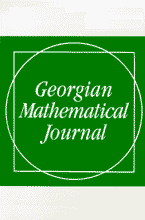
Georgian Mathematical Journal
Championing excellence in mathematical exploration.Georgian Mathematical Journal, published by Walter de Gruyter GmbH, is a prestigious academic journal dedicated to the field of mathematics, particularly in its multifaceted applications and theoretical explorations. With an ISSN of 1072-947X and an E-ISSN of 1572-9176, this journal is indexed within notable databases and holds a strong position as evidenced by its Q2 ranking in the Mathematics (miscellaneous) category as of 2023 and a ranking of #140 out of 399 in the general mathematics Scopus category, placing it in the 65th percentile for research visibility. Since its inception in 1994, the journal has continued to evolve, aiming to foster innovative research and scholarly communication among mathematicians worldwide. Although it does not offer Open Access, the journal’s commitment to quality and rigor ensures that published works are of high relevance, appealing to researchers, educators, and students who are dedicated to advancing mathematical knowledge across diverse domains.